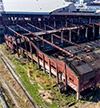When Area Development asked me to sit in as guest editor for the Q2 2024 issue, I was excited for a chance to contribute because it’s such a pivotal time in our industry because of energy.
The old adage, "History repeats itself," reminds us of the need to learn from the past to avoid repeating mistakes. Throughout America's rich history, visionary leaders and groundbreaking innovators have reshaped our way of life. One notable exploration of this narrative is the captivating miniseries "The Men Who Built America," which chronicles the evolution of our nation through the lenses of Vanderbilt, Carnegie, J.P. Morgan, Rockefeller, Edison, Tesla, and Ford. The documentary shows how industries such as oil and gas, rail, telegraphs, telephones, automobiles, and electricity transformed this country, taking us from the humble origins of the settlers to the dawn of a new era.
As our country evolved, disruptors emerged, driving innovation and progress. From the introduction of running water, electricity, and telephones in homes to the transition from radio to television, each advancement pushed us forward. Our country was transformed into a manufacturing powerhouse, dotted with lavish department stores that J.L. Hudson and Marshall Field created, drawing in visitors to marvel at their architectural beauty and brilliant displays. And innovation continued – continuously improving on existing technologies, leading to better cars, televisions, and modern living amenities.
The country continued to change and accelerate with the advent of pagers, beepers, and personal computers. We witnessed the evolution from bulky eight-track players to compact discs, revolutionizing how we stored and accessed data. Walter Cronkite, Peter Jennings, Ted Koppel, Dan Rather, and Tom Brokaw were where most of us got our news. The paper came every morning, and I was excited to see the box scores from the baseball game the night before. Then my dad took the plunge and got us cable. A kid from Detroit ultimately fell in love with Harry Caray, Ryne Sandberg, and Rick Sutcliffe watching the Cubs on WGN. The summer of 1984 was one I will never forget – watching the Cubs during the day and listening to the Tigers on the radio at night.
Then came the internet—a game-changer that redefined communication and commerce. From dial-up services like Prodigy to the rise of AOL and instant messaging, the digital age was upon us. Despite initial doubts and missteps, online shopping slowly gained traction, paving the way for e-commerce giants like Amazon. The subsequent introduction of smartphones—with their multifunctional capabilities—seemed to fulfill every conceivable need.
Our aging infrastructure, conceived by visionaries like Edison and Tesla, struggles to support modern needs. The rise of electric vehicles and data centers underscores the urgency of updating our grid and exploring sustainable energy solutions.Fast forward to March 13, 2020. The world stopped. COVID-19 had swept the nation. And while the pandemic may have disrupted life, it forced individuals to adapt and innovate. During COVID-19, people learned how to survive under unique circumstances. We evolved. Prior innovation allowed us to get essential goods. E-commerce, while on its way before the pandemic, became a big part of the solution to social distancing and supply chain troubles. Even my 90-year-old grandmother and my 8-year-old kid learned how to live on a device. They could get the news, go grocery shopping, and even get an education. Commerce could continue to grow, and it truly disrupted the world of industrial real estate. This change was so fast that the country fell short on the labor needed. In response, companies turned to automation, figuring out how to do more with fewer people.
Innovative titans like Bezos, Musk, Zuckerberg, Brin, Cook, and Gates spearheaded advancements in energy and technology, facilitating virtual meetings and entertainment streaming. Yet, within this digital revolution, a new challenge emerged: the demand for energy. Our aging infrastructure, conceived by visionaries like Edison and Tesla, struggles to support modern needs. The rise of electric vehicles and data centers underscores the urgency of updating our grid and exploring sustainable energy solutions.
As site selectors, our role is to navigate this ever-changing landscape, identifying opportunities and mitigating risks for clients. Whether assessing supply chain logistics for e-commerce facilities or evaluating workforce availability for manufacturing plants, we ultimately need to advise clients on all the critical location factors and pair them with the right real estate and public partners to make this facility successful.
We are in the early stages of the great electron race—a competition between continual innovation for tangible goods versus the demand for a digital society. While this competition exists, there will be winners and losers, yet the question remains: Who will be the next name in the history books? Who will provide the innovation necessary for potentially a new type of energy? While we are in this transitional time, we need to be looking for ways to mitigate the energy supply risks. The adventure of this manufacturing era is moving at a torrid pace. The time to enter the search for a manufacturing facility was two weeks ago, so start now if you want electrons before they are all gone...
The great electron race is underway, and those who innovate and adapt will shape the future of our continually evolving digital society.




